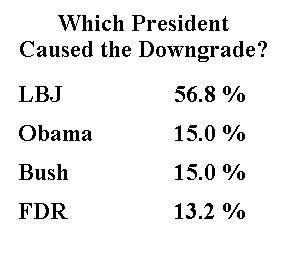Steve Chapman notes the difficult transition from supporting spending cuts in general to supporting specific program cuts:
The good news is that the idea of serious spending restraint has more support than ever before. The bad news is that getting people to support the concept is easy. The hard part is getting beyond the concept, and there is no sign so far of doing that.
Several Republican presidential candidates, including Michele Bachmann, Ron Paul, and Rick Santorum, have taken what sounds like an uncompromising stand. They’ve signed on to a plan sponsored by a group called Strong America Now to eliminate the federal deficit by 2017 without tax increases.
But the plan is not a plan. It’s a fantasy. As Strong America Now’s website explains, it is supposed to “detect and eliminate 25 percent of spending per year across the federal government.” Per year. Seriously.
Not only that, but those cuts are supposed to excise nothing but vast quantities of waste — rather than programs that actual people care about. And my impression is that we’ll pay for it all by raffling off unicorn rides and following leprechauns to find pots of gold.
[. . .]
Social Security, Medicare, and Medicaid soak up some 40 percent of the budget, and their share will expand as baby boomers sidle off into retirement. But in an April Economist/YouGov survey, only 7 percent of Americans — including just 9 percent of Republicans — favored lower funding for Social Security. Medicare? Also 7 percent, with 11 percent of Republicans agreeing.
Even the rise of the Tea Party and the fight over the debt ceiling have not caused people to come to grips with fiscal reality. An August Economist/YouGov poll found that 56 percent of Americans said we can bring spending under control without reductions in Social Security and Medicare. Only 24 percent admit what every fiscal expert knows.

 Well, it turns out that Social Security is a relatively minor part of the problem, so even though President Roosevelt’s policies exacerbated and extended the Great Depression, the program he created is only responsible for a small share of the fiscal crisis. To give the illusion of scientific exactitude, let’s assign FDR 13.2 percent of the blame.
Well, it turns out that Social Security is a relatively minor part of the problem, so even though President Roosevelt’s policies exacerbated and extended the Great Depression, the program he created is only responsible for a small share of the fiscal crisis. To give the illusion of scientific exactitude, let’s assign FDR 13.2 percent of the blame.

